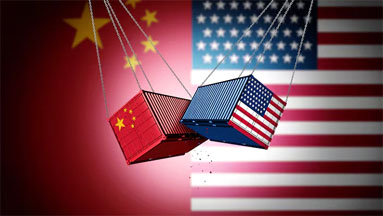US President Donald Trump on April 16 ratcheted up his tariff offensive up to 245% on China. He also declared it’s up to China to return to the negotiating table after Beijing backed out of a high-stakes Boeing aircraft deal.“The ball is in China’s court,” Trump said in a statement delivered by White House press secretary Karoline Leavitt. “China needs to make a deal with us. We don’t have to make a deal with them.”
In reaction, China said it was “not afraid” of engaging in a trade war with the United States, while repeating its call for dialogue. “If the US really wants to resolve the issue through dialogue and negotiation, it should stop exerting extreme pressure, stop threatening and blackmailing, and talk to China on the basis of equality, respect and mutual benefit,” foreign ministry spokesman Lin Jian said.
Why it matters
Despite China’s tough talk, it faces deeper economic vulnerabilities than the US, and a prolonged trade war could inflict lasting damage on its export-reliant economy. While both nations are absorbing shocks, the pain may be far more acute for Beijing — not least because of how much it still depends on American consumers.
“They’ll run out of bullets first,” Trump reportedly told aides during his first administration.
That sentiment is now being stress-tested as China grapples with a triple blow: Plunging exports, sluggish consumer demand, and a weak job market.
Why China is at a disadvantage
Despite its rhetoric, Beijing is boxed in—economically, politically, and strategically. Here’s why:
Exports still power China’s economy
Despite its attempts to diversify exports, China still remains deeply reliant on US markets. Exports account for nearly a third of its GDP, and up to 20% of that goes to the US when indirect trade routes are factored in. Goldman Sachs estimates that up to 20 million Chinese jobs depend on these exports. Beijing has talked for years about pivoting toward domestic consumption, but the reality is that its economy is still built to sell to the world—especially to America.A sudden collapse in US-bound trade will hit employment, growth, and local government revenue hard.
China is fighting from a weaker economic position
China’s economy is already under stress—from deflation, a property market crisis, and weak private sector investment. Tariffs only deepen those vulnerabilities. While Q1 growth was 5.4%, much of that came from front-loading shipments to beat the tariff clock. Forecasts are already falling: Nomura cut its 2025 GDP estimate to 4%, UBS to 3.4%. China can’t afford another economic shock, especially one it didn’t initiate.Yet that’s exactly what this trade war is becoming. As per estimates, China’s GDP growth may get a hit of about 2% if the trade war continues.
The domestic market can’t absorb the shock
Officials tout China’s 1.4 billion consumers as a buffer against trade shocks. But household confidence is fragile. Property prices are falling, youth unemployment is high, and consumer sentiment has yet to rebound post-Covid. People are saving, not spending. Many middle-class households already saw their wealth eroded through the real estate slump, and stimulus has only provided short-term relief. Domestic demand is not yet strong or stable enough to replace the loss of US market access.
The Communist Party’s legitimacy is at stake
Unlike Washington, where economic pain can be chalked up to politics, China’s ruling party has no opposition to blame. The social contract in China hinges on stability and rising living standards. A prolonged trade war that drives unemployment up and incomes down could create unrest—and that’s politically dangerous for the leadership. Beijing may talk tough, but it knows that economic discontent can turn volatile fast, especially in urban centers where jobs are drying up.
US-China tariff war: Why Trump thinks Xi Jinping will blink first

Leave a Reply